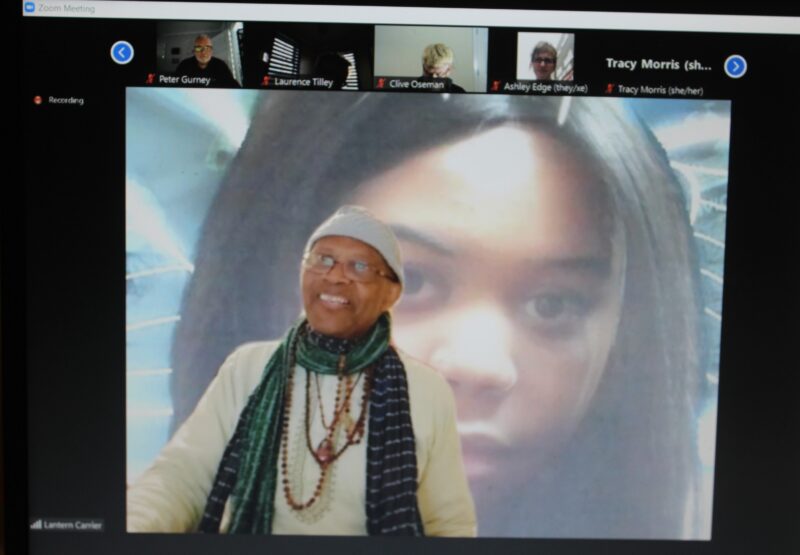INTERVIEW: FIRE & DUST MEETS THE LANTERN CARRIER
I wish I could sing like starlings;
Dart within the foliage of lush green leaves.
Display the eloquence of nightingales,
Awakening the flowers with magical words.
I wish I could resonate like music, me, floating
On chords, whispering to the Heart: “I love you!”
Then I will dance with illustrious moon beams;
Laugh with the shooting stars of heaven.
I wish to disperse like clouds of dawn,
Revealing the splendour of the radiant sun.
Soaring, like the immortal Phoenix,
To bask in the joys of perennial freedom.
I wish I could flirt like the hummingbird,
Adorned in a tapestry of effulgent Light.
Kissing the cheeks of morning glories;
Transmitting their Light with vivacity.
I wish for the smile in the breath of Silence,
Offering praises to the glories of Love.
-‘ I Wish for the Smile in the Breath of Silence’ by Manatita,
The Lantern Carrier. 10th August, 2020
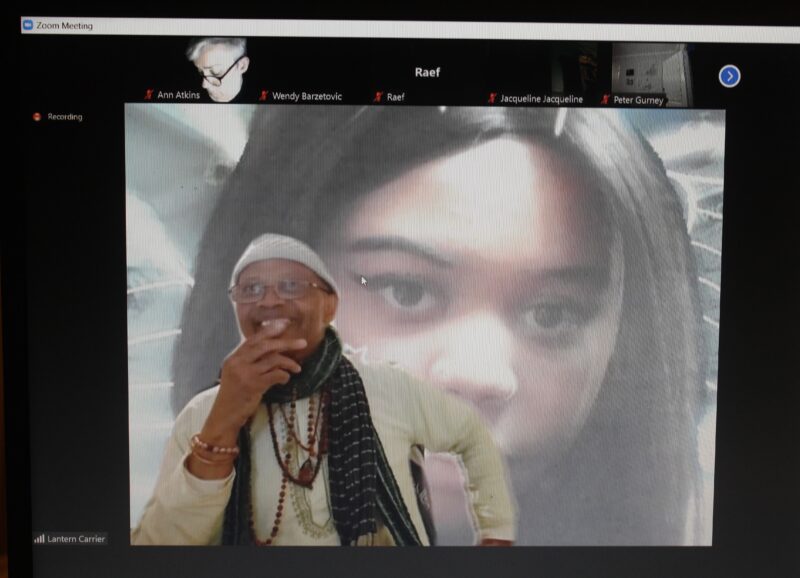
Manatita, a.k.a The Lantern Carrier, has been on the poetry scene for twenty-three years. He grew up writing poetry aged four, but switched to inspirational and meta-physical poetry when he took up the meditative life. Equally at home with performance pieces, Lantern Carrier has featured at Spoken World Online, BYOB at Boxpark, Mind Over Matter, Oooh Beehive, Luna Legacy, Hidden Literature, Flo Vortex and many other venues, including the famous Nuyorican Cafe and in Nairobi, Kenya. He has also won a Hammer and Tongue slam and made it through to the national final. In addition to poetry, Lantern Carrier writes short stories, essays, and flash fiction and he’s the author of four books, including ‘Blossoms of The Heart’ (Poetry). Lantern Carrier’s work features an abundance of imagery, touching on a variety of topics such as nature, music, light, colour and dance, in their kaleidoscope of different forms. He endeavours to reach his audience’s hearts, to elevate, to enlighten and to bring wisdom through his poetry.
For several years, he’s also been a supportive member of our online Fire&Dust community, always posting positive comments for other poets in the chat. On 11th May 2023, The Lantern Carrier was the guest headliner at Fire&Dust on Zoom. We caught up with him after the gig, to ask a few questions…
HCE: Please tell us a little about your journey as a writer so far. What inspired you to start creating and performing poetry?
LC: My journey as a writer started when I was about four years old. I wrote many poems, short stories and science fiction works. I also wrote about love. I was born with an interest in studying the English Language and Literature and this was, by far, my best subject at school. In some ways, loosely speaking, I was finished reading by eleven years of age. I had covered so much! I only became conscious of the Source of my inspiration when I was thirty years old. I had a series of spiritual experiences while reading a book, which dramatically altered my consciousness, shaping it into what it is today, forty-one years later. Since then, I have followed the mystics Rumi, Hafez, Mira, Rabia, Kabir and many more, including my own spiritual teacher, Sri Chinmoy. This has heavily impacted the direction of my innate gift for writing.
HCE: During the gig on Zoom, one audience member pointed out that your poetry lives up to your name! What first inspired the moniker/persona of ‘Lantern Carrier’?
LC: A very insightful question. I gave myself the name The Bard of Solace, as my work was initially Sonnets, free verse Sonnets and Odes. I followed in the footsteps of many great English and American poets: Shakespeare, Blake, Wordsworth, Wadsworth…Emily Dickinson, and so forth. I did a performance to a theme – The Sad Face of War – and the hostess thought it was brilliant, but said it did not remind her of solace. However, all my poetry is message-filled, and so I wanted a name to reflect that which illumines, elevates, inspires the Heart…the psychic Heart. So, I looked at a few and came up with The Lantern Carrier, a name that reflects the Light (Awakening) that my poetry conveys to receptive souls.
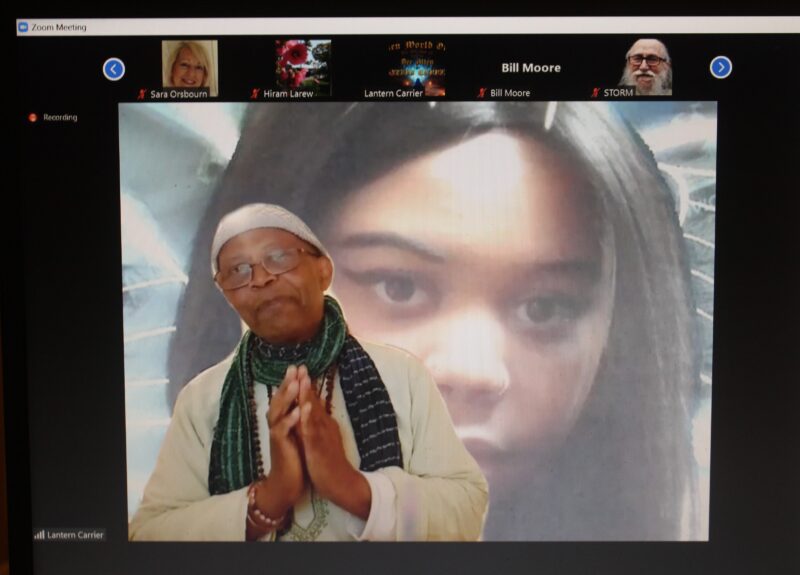
HCE: Who is your work aimed at – do you have an ideal audience in mind when you’re putting a poem together?
LC: The mystic sees himself as a soul and all beings as souls. There are no separations in the life of a mystic. The Absolute and the creation are One. All beings exist in Consciousness/Spirit. So, my work is aimed at serving souls. You and I create this world by the vibrations that we offer to it and so words are a life-force that can affect us in harmonious or negative ways. It is the Light or voice of the individual soul, each in accordance with the soul’s growth or evolving Consciousness. We can only relate from the rung on which we stand, on the ladder of evolution. Souls at a similar level, feel our inspirations.
HCE: Would you say there are themes or motifs that you gravitate to in your work? What appeals to you about these?
LC: Most certainly. Love is the motivating force. Love as the invisible strand that holds all life together, the very pulse of Being. Yet I see myself as a creative writer in the sense that I am very diverse in my 3,000 poems. I also cover social justice and I am a nature and ecology lover. I do many of what I call ‘observational poems’, as well as ethereal and mystical pieces. Some poetic circles also give themes and I write on them. They may include holidays like Easter or Christmas, Diwali, or Red Rose Day…yet the cosmic element sooner or later surfaces in my poetry.
HCE: Comments in the Zoom chat while you were reading demonstrated how quotable your writing is, and how different parts of poems will speak to/resonate with different listeners. How do you manage to write in such a way that it appeals to people beyond your own faith?
LC: Because my six or seven words in poetry are common to all. Firstly, they include everyday words and secondly, I’m appealing essentially to Heart and soul, not the mind. These words are: nature, cadences, Light, Love, images, superlatives and colour…from these I create everything else.
Let us look at cadences: rhythm, tempo, beat, dance, movement, lyrics…music, melody, arias, takes me to instruments…to flowers…to nature…do you see how I work? All seven words are intertwined like Love itself.
HCE: Many of your poems reflect on and celebrate aspects of humanity and nature, showcasing your skill for imagery. What tends to come first in your writing process – do your images grow from the overall concept as it takes shape, or do you start with some clever metaphorical lines and build on them?
LC: I am a gifted writer. I can write 100 poems a day, let alone these 30 per month that humans struggle with. This is because lines come to me easily. In my sleep, in the waking state, from what you say, in pictures, on buses and trains, in nature…I always carry a pad.
Do you notice that sometimes even my comments are poetic. People tell me this and then I say, “Wow! Did I write this?” So, I can also take lines from spontaneous comments that I like. I give all credit to prayer and meditation… to the Voice within.
I do not think metaphors, but I think images; it is not enough to say, ‘I Love You!’ but to tell you of the Joy and sweetness I feel within when you are near me, which is priceless and eternal! Yet everything begins within in seed form. Could be nature related, or social justice or Love. Generally, when I write a line down, I stay with that thought.
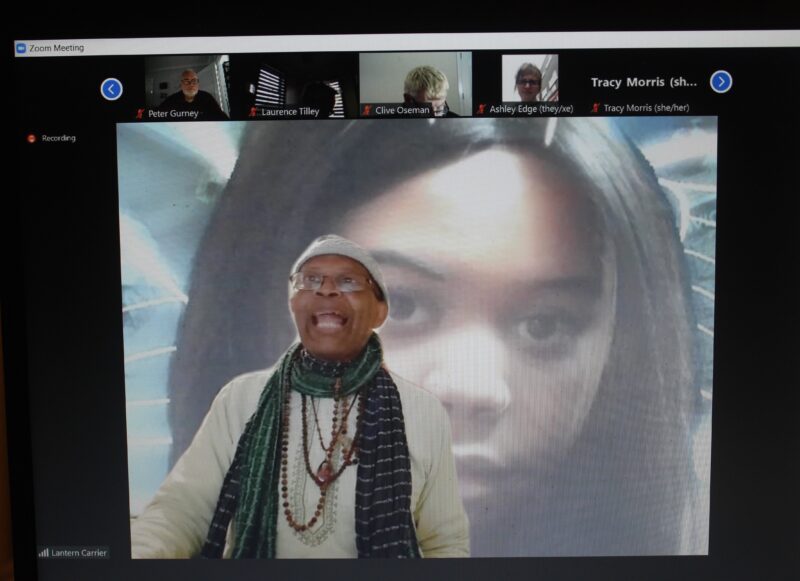
HCE: Do you enjoy competing in poetry slam events? What are some good ways to prepare for a slam?
LC: Well, I had to start writing 3-minute poems to compete. I also do it as no one wants to pay £10.00 for a public venue and be told he can do only one poem. This happens a lot because of a host having two headliners. So, if you are going to get to do only one poem, 4 minutes is better than a Sonnet of 14 lines (55-60 secs).
I do not enjoy Slams anymore. Slams have five judges who turn up with friends and the whole thing is subjective. I’ve heard hosts praising poets even before the judges write their scores. I’ve heard hosts telling judges they are scoring too low, halfway through the competition. The individual then increases his score, but what about the six poets he had already scored previously?
Today’s hosts are fairer as they discard the top and lowest score to minimise bias and count only three scores. But you always need five judges for this and sometimes they have only three and count all three scores. Having said that, with this last system, many winners are also crowd favourites, but some aren’t. It is truly a subjective thing.
One person does a sizzling piece about sex and wins, and another does a very clever and well-put-together piece on life and loses. So, to repeat: we see, judge and write poetry, according to where we are, on the rung of the ladder of evolution. What helps?
1. Where possible: pre-planned, experienced judges. (Some are pressured into judging after only six months of poetry and must ask what to do).
2. At least five judges, always.
3. Some poets enter Slams with a psychological advantage because they are popular and well-known. This gives them a mental advantage.
4. Some hosts allows the audience to do the scoring. Supervised properly and in some areas, it works.
HCE: What elements do you feel most well-written poems have in common?
LC: Content. They are related, well-written, engaging, clever and flows well, even without being read. Yet reading a poem can show hidden beauty.
Light-heartedness. We all want to laugh.
Length. Should be just right. Most hosts on the London scene, do not like a poem greater than 5 mins, and even that can be too much from some novices.
Impactful, reflective (makes you think) and lyrical. I covered lyrical in ‘flow.’ It should flow, like a stream, like a river.
Use of grammar for pauses. Many poets don’t do that. It is fine when they read their works, but the books should flow as the poet does.
HCE: In your opinion, what more should arts communities be doing to support poets of colour to make sure their voices are platformed and heard?
LC: They can apply for grants to cover certain topics, which is being done successfully, like the Windrush problem, Grenfell. Sponsor or build youth organisation with Elders to encourage workshops and community values. Teach about heroes and heroines, like Marcus Garvey or Mary Seacole, a nurse and contemporary of Florence Nightingale. Government is now acknowledging her and her contributions, but, during Covid, they still named all the new hospitals after Florence Nightingale.
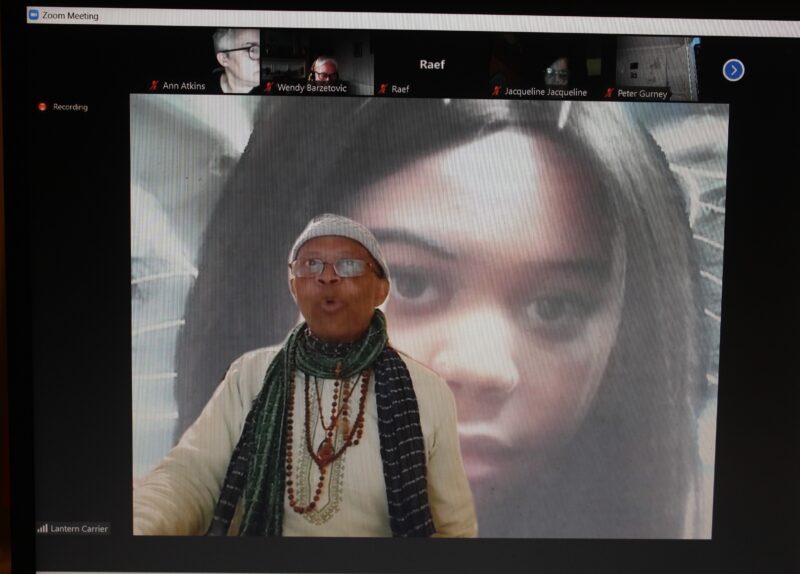
HCE: What type of poetry do you seek out for personal enjoyment? As a reader/listener, when you engage with a poet’s work, what are you hoping to get out of it?
LC: Humour and laughter. Styles and intonation, engagement…some poems, like a good novel, just hold your attention, but again, they are usually touching on something we either like or wonder how it was done, like a great image. Poems that can make me say wow, and some can equally keep me silent. Going deep within, like that of Kahlil Gibran, like Sri Chinmoy or Rumi.
Good poems can do both! We will take from the poetry, what we see in ourselves. I have said this here in different ways and some themes would be more appealing than others. There are poets who write largely about sex. Some do it exquisitely and some are raw and vivid. I do not like the second style. Usually, even a fool can do that, but yes, it seems to appeal to certain audiences. Each group has its own energy, its own vibration/consciousness.
HCE: What’s next on the horizon for you? Are you already working on projects/booked for upcoming performances?
LC: I have two books out and Blossoms of the Heart is available from Marissa Prada of Read or Green Books. It is comprised of regular Sonnets, Odes, and free verse. I hope to bring out Whispering Praises to Love within six months, perhaps. I write a great deal and have little time to attend to manuscripts.
HCE: What’s the best way for people to keep connected with you and your work, or contact you about bookings?
Instagram Facebook Twitter YouTube
Lantern Carrier’s Hubpages features 800+ articles on poetry and life issues as well as stories and reviews, essays:
Hubpages
PayPal: ceeccil@hotmail.com
